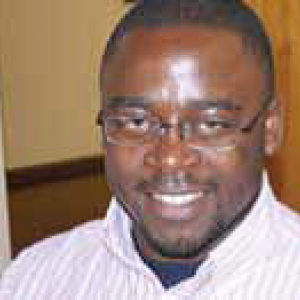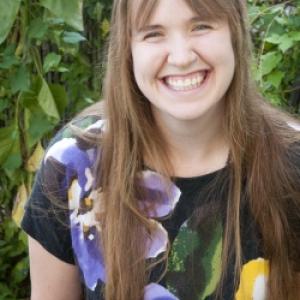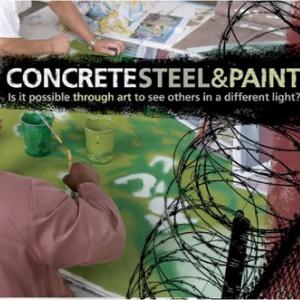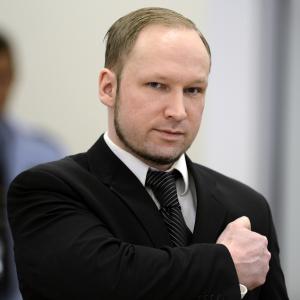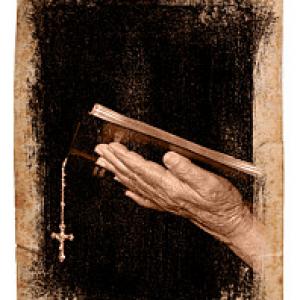
In his book, Acts of Faith, Eboo Patel writes, “My struggle to understand the traditions I belong to as mutually enriching rather than mutually exclusive is the story of a generation of young people standing at the crossroads of inheritance and discovery, trying to look both ways at once.”
Anne Marie joins Sojourners at a similar crossroads. After graduating from Earlham College with a BA in Religion, she is eager to continue evaluating and envisioning what it means to be a Christian, a peacemaker, and a young adult in the world today. She looks forward to a rich year of discipleship and intentional community living.
In her free time, Anne Marie can be found practicing yoga, studying Hebrew, writing, baking cookies, and watching episodes of 30 Rock on Netflix (Tina Fey is so brilliant!).
Posts By This Author
'Relevance' Is Not Enough
Many young adults are leaving the church these days. Two 20-somethings reflect on what keeps them in the pews.
LAST FALL, I (Anne Marie) decided to take a break from the church I had been attending to check out a nearby Episcopal service with one of my housemates, Joshua. I had no idea at the time that this might turn into a permanent switch. My Baptist, Anabaptist, and evangelical roots don’t quite explain what drew me to St. Stephen’s Church that Sunday, but I remember the thought that kept going through my head: I need to take Communion.
For a number of reasons, I had been feeling apathetic toward Christian faith. I needed something official and visceral to cleanse me of the growing indifference I felt. The thought entered my mind: I need some bread and wine, because if my own prayers can’t kindle the spirit of Jesus within me, then I’ll get him in there by force. I hoped that partaking in the real-deal-flesh-and-blood would allow me to return to my own church in peace.
I can’t say that the Episcopal service that day cured me of all my doubts and frustrations about Christianity, but I did find meaning in the liturgy, rituals, and traditions that continued to sustain me in my first year in a new city. As Joshua and I continued to attend St. Stephen’s, we each reflected on what we, as young adults, are looking for in church and Christian community.
Church advertisements often focus on how to keep young people “engaged,” and there are countless new books about why young people are leaving the church. Statistics show decreased church attendance among those in our generation, and while this may be cause for concern, I’m not too worried about it. I’m glad that churches and denominations are interested in engaging young people, but so often this well-meaning desire is rooted in fear and anxiety about the future of the church. Is Christianity becoming obsolete? Will the church die away?
News flash: Christianity isn’t going anywhere. But churches and denominations may have to adapt—and not necessarily the way they’re doing so now—if they are to survive.
As 20-somethings who’ve left the cocoons of family and college for our first forays into the “real world,” we have two basic conclusions about what we are looking for in church communities.
Four Questions for Kelvin Hazangwi
Kelvin Hazangwi, executive director: Padare/Enkundleni Men's Forum on Gender in Harare, Zimbabwe
Bio: Executive Director, Padare/Enkundleni Men's Forum on Gender in Harare, Zimbabwe — www.padare.org.zw
1. How are women working for gender equality in Zimbabwe? We have a very strong women’s movement in Zimbabwe. We have the Women and AIDS Support Network. We have the Campaign for Female Education, an organization doing wonderful work giving grants to girls so that they stay in school. We have another organization that deals with violence against women; there are no government-provided shelters for battered women in Zimbabwe. There are organizations for young women, for women in rural communities—I could go on and on.
2. “Padare” and “Enkundleni” mean “meeting place” in Zimbabwe’s Shona and Ndebele languages. What does Padare work to do? We are not bringing a new agenda to the table; we are saying, let’s look at all of these women’s organizations and the issues they’re bringing—violence against women, access to education, access to reproductive health, HIV and AIDS. What can men do? Perpetrators of violence against women are men. Men can make a personal commitment of not being violent against their partners. That’s a political statement, but from a very personal perspective. So the feminist slogan that “the personal is political” is equally applicable to men.
Two Reasons I'm Not A 'None'
Editor's Note: Anne Marie Roderick tells her story of why she's NOT part of the 20 percent of Americans who identify with "no religion in particular." Find more stories (or share your own) HERE. Read about the study HERE.
It’s not surprising that a third of my peers say they are religiously unaffiliated. Our religious lives are too complex these days to fit in neat boxes with one-word labels. I may be a “Christian,” but does that mean that I am like other Christians? Not necessarily.
There is sometimes more truth in being a “none” — in stating what we are not — rather than trying to pin down exactly what we are. But, I choose to affiliate anyway. Here’s why I am not a “none:"
Six Questions for Leila Sansour
Leila Sansour, Catholic Palestinian film director and founder of the nonprofit Open Bethlehem
Bio: Catholic Palestinian film director and founder of the nonprofit Open Bethlehem. operationbethlehem.com
1. How did Open Bethlehem get started?
Growing up in Bethlehem, I always wanted to leave. I settled in London, but when events started becoming worse and worse in the region, I wanted to do something. So I went back and started working on a film. My cousin encouraged me and said, “Look at what’s happening to our city. Why don’t you do more than just a film?” And so together, in 2005, we started a campaign called Open Bethlehem.
2. What is its main goal?
The idea is to use Bethlehem as a doorway into the region. We created the Bethlehem Passport, which is like an honorary citizenship, inviting people to partake in the town that stands for joy and goodwill to all. The passport is an appeal to everybody to do something to help bring peace to the Middle East. We aim mostly at educating people abroad—policymakers, the media, and church leaders—about the plight of Bethlehem, its Christian community, and the diversity of the city.
Murals and a Great Divide
"Concrete, Steel, and Paint," directed by Cindy Burstein and Tony Heriza
THOSE OF US who are passionate about prison reform could talk at length about the injustices of the penal system, but prison activists and concerned citizens sometimes gloss over the internal conflicts of prisoners in their daily lives as well as the pain and fears of crime victims in local communities. The documentary Concrete, Steel, and Paint raises some essential questions about hope, forgiveness, and reconciliation through the moving story of unlikely partners—those incarcerated for committing violent crimes and those affected by violent crimes—who come together to create a mural in their community.
The film begins at Graterford Prison near Philadelphia, a maximum-security institution where men are serving long sentences for violent crimes, including homicide. The men interviewed for the film seem thirsty for opportunities for healing. One of the first prisoners we meet, Tom, says: “When you do wrong that you can’t correct, it’s horrible.” Another inmate, Zafir, tells the camera: “I don’t want my legacy to be that I was a murderer.”
The energy for a mural project came from Jane Golden, the executive director of the Philadelphia Mural Arts Program, who believes in the power of art, and murals in particular, “to shift the consciousness of a community.” Golden began working with prisoners in Graterford in the early 2000s. The men in her workshops eventually came up with the idea to reach out to the community. “I thought it was an interesting idea,” Golden says, “but I told them the only way this can possibly work is if we can get the community involved.”
After a significant amount of pushback from community members, Golden suggests making two separate mural walls to convey the different journeys of offenders and victims. “It’s healing for me to tell my story,” says the mother of a homicide victim. “Maybe it will be helpful for them to tell their story.” The film teaches viewers that there are points of similarity in these stories—hurt, loss, anger, regret—and there is a shared desire for healing and for change, but the journeys are still different and portraying them in shared space could minimize the ability to convey truth for each group. Can offenders and victims of crime ever share a platform to express pain, to ask for healing?
'Croon Her to Sleep with Freedom Songs'
The goal of social justice parenting is not to produce the "right" kind of child—it is to create an environment in which love flourishes.
How do you get your kid to care about social justice? Well, you can bring her to marches and protests on important issues before she’s old enough to walk; croon her to sleep with freedom songs; or fill her Christmas stocking with fair-trade goodies.
My parents did all that when I was little. Some of my earliest memories involve talking to homeless people in my neighborhood, attending demonstrations with my church, door-to-door lobbying with my mom, even dressing up as Winnie the Pooh on a couple occasions to raise awareness about corporate child labor practices. But these events were just the side effects of having activist Christian parents; they say little about our family life and my own formation as a young person.
Perhaps one of the keys to social justice parenting is to ignore the question above. You can’t get your kid to care about social justice issues. Much like you can’t force your child to be a Christian, to dress a certain way, or to listen to certain music, you can’t set out with a goal to shape your child’s passions and interests. Parents who do this either get lucky or, more likely, meet strong resistance from their young ones. My father tells me that the question parents should continuously ask themselves is this: How can I reflect a vision for a more just and compassionate society within my family?
The goal of social justice parenting is not to produce the “right” kind of child—it is to create an environment in which love flourishes and the structures of family life are consistent with a vision for a better world. In my family, this meant that we functioned democratically (or, to my 4-year-old mind, with everyone “on board”). For the most part, we made decisions at weekly family meetings in which everyone had an equal opportunity to participate. My parents tried not to use age, education level, and income as trump cards for important family matters. That is, we rarely heard the phrases: “Because I said so,” or, “Because I know more than you do,” or “Because it’s my money.”
Beer & Hymns: Imagining Christianity
As we attended workshops and concerts, met new people, and tried to make sense of the larger impact this gathering might have beyond us, we kept coming back to that statement we heard early on about Walter Wink. What is Christian imagination? How do we imagine Christianity? Whatever it means, imagining Christianity is exactly what happened at Wild Goose.
Here's an example: Throughout the weekend, Fullsteam, a craft brewery in nearby Durham owned by an alumnus of Wheaton College (yes, that Wheaton) sold selling beer to quench the thirst of Goosers during late night sessions and performances (a la Homebrewed Christianity, etc.). And on Saturday afternoon — call it an early evening happy hour — a group of rag-tag musicians, armed with a few folk instruments, a trumpet and percussion, led a jolly crowd of more than 100 in Sunday School choruses and old-timey spirituals. They called it, “Beer and Hymns."
There, caught up in a holy wind of hops and hope, we reimagined what church might be during an ad hoc version of “He’s got the Whole World in His Hands.” We the motley worshippers alternated “He’s got the whole world” with “She’s got the whole world,” proudly singing at the top of our lungs, “She’s got the liberals and conservatives / the gays and straights / and a big ole mug of beer/ in her hands.”
Four Questions for Rev. Gerald L. Durley
Rev. Gerald L. Durley, Pastor of Providence Missionary Baptist Church in Atlanta, Gerogia
Bio: Pastor of Providence Missionary Baptist Church in Atlanta, Gerogia, providenceatlanta.org
1. How did you get involved in environmental justice?
About six years ago, Laura Seydel, Ted Turner’s daughter, invited me to see a movie, The Great Warming. At the time, the environment was the last thing on my mind. I was more concerned about HIV, cholesterol, diabetes, unfair jail sentences, disparity in drug sentencing—these kinds of things. But I went to see the film.
The next thing I knew I was talking to African-American pastors about something that was not on our screen: Earth Day. If we understand that God created a perfect earth and that we’re destroying it, then we have an obligation to enlighten our people about this and find out what we can do. And I had to tell the people in the old environmental community that this is not a campaign—it has to be a movement, similar to the civil rights movement. People must be involved, knowledgeable, aware.
2. Why have you used the word “conversion” to talk about your awakening to environmental needs?
I could not make the connections initially between my community and polar bears, so I began to read about it. Once I began to understand, I took it from 2 Chronicles 7:14: “If my people will humble themselves and seek my face, turn from their wicked ways, then I will hear from heaven and heal their land.” I saw the land as bigger than just the ground; I saw the land as being all of us, as one. If God can create a climate where animals and plants and human beings work together, we have a responsibility to try to maintain that balance. That’s when the “conversion” really hit me.
Mother's Week: Undervaluing Women
There is a beautiful story that some Christians have learned to tell about motherhood. This story is one of strength, faith, sacrifice, loss, and unconditional love.
Our Biblical mothers, from Eve to Mary and everyone in between (Sarah, Leah, Rachel, Jochebed (the mother of Moses), Bathsheba, Hannah, and Elizabeth to name a few) provide examples of women who defied societal constraints to protect their children; who gave them up so that their children might prosper; who supported, loved and nurtured their sons absolutely, without the expectation that that same love would be returned to them.
In Mary’s story we are called to appreciate the mother who shepherded truth and salvation into the world, whose faith made our faith possible today. The Christian story of motherhood is one I am proud to tell and one I hope to live into one day.
On Mother’s Day, we have the opportunity to reflect on the gifts of motherhood, to lift up the mother’s among us and recognize their strengths, sacrifices, and wisdom--what a beautiful idea. But the problem, in our society, is that one day of cards and flowers just doesn’t cut it. For most of the other 364 days of the year, the lives of women and mothers are undervalued.

Anders Behring Breivik and Muslim-Christian Relations
I opened up the NY Times homepage yesterday to find this headline: On Witness Stand, Norwegian Says He Would Kill Again. Remember this guy? The Times says authorities have described Anders Behring Breivik as a “fundamentalist Christian…obsessed with what he saw as the threat of multiculturalism and Muslim immigration to the cultural and patriotic values of his country.”
He killed 77 people, including 68 teenagers, in Norway last summer.
Although Breivik admits to the murders, he doesn’t believe he should be held criminally accountable—he believes his actions were preventive measures, or, “self-defense.”
A Family's Identity Crisis
Pariah, written and directed by Dee Rees. Focus Features.
Violence, Women, Congress and the Bible
We’ve been hearing a lot in the news media lately about women’s bodies. Just when we thought the messy fight over contraception was over, Democrats and Republicans are butting heads again over renewal of the 1994 Violence Against Women Act, a once widely supported bill that is now being met with opposition from Republicans due to new provisions that “would allow more battered illegal immigrants to claim temporary visas, and would include same-sex couples in programs for domestic violence,” according to the New York Times.
Who Is the One Percent?
According to the Chicago Tribune, new study from Northwestern University attempts to shed light on what the 1 percent actually believes about charitable giving and social problems. The study found that of the more than 100 interviewees with a median annual income of $7.5 million, most were enthusiastic about philanthropy and 92 percent were involved in some kind of volunteer activity. Furthermore, the great majority of respondents cited budget deficits, unemployment, and education as the most pressing issues in the United States today.
So, maybe the 1 percent isn’t so different from the 99 percent?
Wrong.
Follow the Golden Calf: Washington, D.C.
Where in the world is the Golden Calf?
Remember that huge golden replica of the Wall Street Bull that led the faithful of New York to Zuccotti Park a couple months ago? Well, it’s back! And this time the iconic sculpture is serving as more than spectacle.
Members of Catholics United, along with faith leaders and residents of Occupy DC, marched with the Golden Calf from McPherson Square to the Capitol on Thursday to deliver a petition in support of a bill that would raise taxes on the rich.
“If we’re really concerned with the ‘least’ of our brothers and sisters, then cutting their resources isn’t the way to do it,” said Jason Miller, one of the artists who worked on the Calf and a member of Catholics United. “We need to get rid of the deficit, but not on the backs of the poor.”
Project Safe Surrender
Last week, 2001 cases were resolved — many were dropped and others left offenders with minor fines. People who showed up to the event also received resources and assistance for services related to health, housing, employment, and education.
While the program is not explicitly religious, church and clergy involvement shed light on the Christian spirit of the initiative. Project Safe Surrender is not quite Jubilee— offenders aren’t guaranteed amnesty — but there is a taste of the Resurrection.
Bono Fights the Good Fight
Today marks the anniversary of World AIDS Day. The USAID estimates that since the epidemic began, over 60 million people have been infected with the disease, and over 25 million lives taken.
One of the most prominant figures fronting the fight against AIDS is U2 frontman, Bono. In 2002, Bono became vocal about the epidemic, embarking on a tour across the American Midwest to recruit churches to join the fight against AIDS in Africa. In Christianity Today’s 2003 feature “Bono’s American Prayer,” (written by Sojo’s own Cathleen Falsani) he articulates the crucial role the church must play in combating the epidemic.
"If the church doesn't respond to this, the church will be made irrelevant. It will look like the way you heard stories about people watching Jews being put on the trains. We will be that generation that watched our African brothers and sisters being put on trains."
White House Honors National Adoption Awareness Month
As many of us head back to work or school and continue to recover from our post-Thanksgiving-turkey-induced food comas, let us remember that November is National Adoption Month. While we can be thankful that over 1.5 million children have found permanent homes through adoption (according to 2000 census), there are still 107,000 young people awaiting adoption in the U.S. foster care system.
National Adoption Month, which began in 1995 under President Clinton, seeks to celebrate and raise awareness about adoption around the country. Today, the White House is sponsoring an event to honor National Adoption Month with “senior Administration officials, members of the President’s Cabinet, adoption and child welfare experts and advocates, and religious leaders,” according to the White House blog for Faith-Based and Neighborhood Partnerships.
Thanksgiving at Occupy Wall Street
If you thought all of the occupiers would go indoors for Thanksgiving, think again. In spite of the recent police raid, hundreds of occupiers, activists, and community members are breaking bread together in Zuccotti Park.
The OWS Kitchen working group estimates over 3,000 meals will be served with the support of local families, restaurants, and organizations who are opening their kitchens to the movement.
When I got down to Zuccotti Park around 2:30pm there was a joyful calm in the area—friends and strangers eating together on the now bare marble benches, others walking around offering pecan pie, vegan meal plates, and other holiday snacks to anyone interested, and a small group of folksy looking people singing “This Land is Your Land” and “We Shall Not Be Moved” with guitars and cymbals.
A nice reclamation of the Thanksgiving meal—less like the oppressive tale of pilgrims and native people we learned about in school; more like Jesus feeding the thousands, the beloved community, etc.
Rule No. 1 of Interfaith Relations: Faith is Required
Did Jesus ever withhold love or healing for fear that he would give up too much of himself?
Did Jesus ever worry that the nature of God would change if he ate at certain tables, or touched certain kinds of people?
Of course not.
The Bible tells us that Jesus continually stepped out of the normative comfort zones of his day to extend his message of radical reconciliation.
I realized that my hesitation to embrace all people interested in an interfaith vision was mostly about my own fear, my own lack of faith. There was nothing Christ-like about it.
Women Underrepresented in Big Business: Does it Matter?
In my vision of the emancipated world, women will not be sitting at the top of some profit-driven society, relishing power and basking in material wealth. In the reign of God, women will be able to take the time we need to be mothers and daughters without having to let go of our more far-reaching aspirations. And men will have the time they need to be fathers and sons. We will love and value ourselves without playing into the false worldly notion that we can and should be "number one." And we won't be afraid to say "NO," when we're tired.
